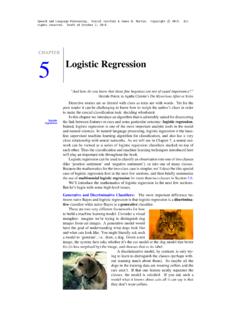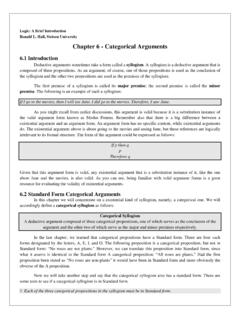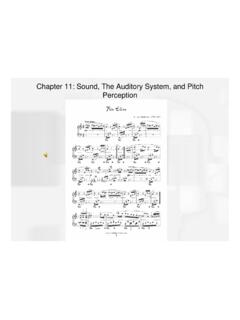Transcription of Death in the afternoon - University of Texas at Austin
1 Ernest HemingwayDEATH IN THE AFTERNOONЭрнест Миллер ХемингуэйDeath in the afternoon is a non-fiction book by Ernest Hemingway about the ceremony and traditions of Spanishbullfighting. It was originally published in 1932. The book provides a look at the history and what Hemingway considers themagnificence of bullfighting, while also being a deeper contemplation on the nature of fear and discussion concerning bullfighting would be incomplete without some mention of the controversy surrounding that end Hemingway commented, "anything capable of arousing passion in its favor will surely raise as much passionagainst it."to PaulineCHAPTER ONEAt the first bullfight I ever went to I expected to be horrified and perhaps sickened by what I hadbeen told would happen to the horses.
2 Everything I had read about the bull ring insisted on that point;most people who wrote of it condemned bullfighting outright as a stupid brutal business, but eventhose that spoke well of it as an exhibition of skill and as a spectacle deplored the use of the horsesand were apologetic about the whole thing. The killing of the horses in the ring was consideredindefensible. I suppose, from a modern moral point of view, that is, a Christian point of view, thewhole bullfight is indefensible; there is certainly much cruelty, there is always danger, either soughtor unlooked for, and there is always Death , and I should not try to defend it now, only to tell honestlythe things I have found true about it.
3 To do this I must be altogether frank, or try to be, and if thosewho read this decide with disgust that it is written by some one who lacks their, the readers', finenessof feeling I can only plead that this may be true. But whoever reads this can only truly make such ajudgment when he, or she, has seen the things that are spoken of and knows truly what their reactionsto them would I remember Gertrude Stein talking of bullfights spoke of her admiration for Joselito andshowed me some pictures of him in the ring and of herself and Alice Toklas sitting in the first row ofthe wooden barreras at the bull ring at Valencia with Joselito and his brother Gallo below, and I hadjust come from the Near East, where the Greeks broke the legs of their baggage and transport animalsand drove and shoved them off the quay into the shallow water when they abandoned the city ofSmyrna.
4 And I remember saying that I did not like the bullfights because of the poor horses. I wastrying to write then and I found the greatest difficulty, aside from knowing truly what you really felt,rather than what you were supposed to feel, and had been taught to feel, was to put down what reallyhappened in action; what the actual things were which produced the emotion that you experienced. Inwriting for a newspaper you told what happened and, with one trick and another, you communicatedthe emotion aided by the element of timeliness which gives a certain emotion to any account ofsomething that has happened on that day; but the real thing, the sequence of motion and fact whichmade the emotion and which would be as valid in a year or in ten years or, with luck and if you statedit purely enough, always, was beyond me and I was working very hard to try to get it.
5 The only placewhere you could see life and Death , , violent Death now that the wars were over, was in the bullring and I wanted very much to go to Spain where I could study it. I was trying to learn to write,commencing with the simplest things, and one of the simplest things of all and the most fundamental isviolent Death . It has none of the complications of Death by disease, or so-called natural Death , or thedeath of a friend or some one you have loved or have hated, but it is Death nevertheless, one of thesubjects that a man may write of. I had read many books in which, when the author tried to convey it,he only produced a blur, and I decided that this was because either the author had never seen itclearly or at the moment of it, he had physically or mentally shut his eyes, as one might do if he saw achild that he could not possibly reach or aid, about to be struck by a train.
6 In such a case I suppose hewould probably be justified in shutting his eyes as the mere fact of the child being about to be struckby the train was all that he could convey, the actual striking would be an anti-climax, so that themoment before striking might be as far as he could represent. But in the case of an execution by afiring squad, or a hanging, this is not true, and if these very simple things were to be made permanent,as, say, Goya tried to make them in Los Desastros de la Guerra, it could not be done with anyshutting of the eyes. I had seen certain things, certain simple things of this sort that I remembered, butthrough taking part in them, or, in other cases, having to write of them immediately after andconsequently noticing the things I needed for instant recording, I had never been able to study them asa man might, for instance, study the Death of his father or the hanging of some one, say, that he did notknow and would not have to write of immediately after for the first edition of an I went to Spain to see bullfights and to try to write about them for myself.
7 I thought they wouldbe simple and barbarous and cruel and that I would not like them, but that I would see certain definiteaction which would give me the feeling of life and Death that I was working for. I found the definiteaction; but the bullfight was so far from simple and I liked it so much that it was much toocomplicated for my then equipment for writing to deal with and, aside from four very short sketches, Iwas not able to write anything about it for five years and I wish I would have waited , if I had waited long enough I probably never would have written anything at all since thereis a tendency when you really begin to learn something about a thing not to want to write about it butrather to keep on learning about it always and at no time, unless you are very egotistical, which, ofcourse, accounts for many books, will you be able to say.
8 Now I know all about this and will writeabout it. Certainly I do not say that now; every year I know there is more to learn, but I know somethings which may be interesting now, and I may be away from the bullfights for a long time and Imight as well write what I know about them now. Also it might be good to have a book aboutbullfighting in English and a serious book on such an unmoral subject may have some far, about morals, I know only that what is moral is what you feel good after and what isimmoral is what you feel bad after and judged by these moral standards, which I do not defend, thebullfight is very moral to me because I feel very fine while it is going on and have a feeling of lifeand Death and mortality and immortality, and after it is over I feel very sad but very fine.
9 Also, I donot mind the horses; not in principle, but in fact I do not mind them. I was very surprised at this sinceI cannot see a horse down in the street without having it make me feel a necessity for helping thehorse, and I have spread sacking, unbuckled harness and dodged shod hoofs many times and willagain if they have horses on city streets in wet and icy weather, but in the bull ring I do not feel anyhorror or disgust whatever at what happens to the horses. I have taken many people, both men andwomen, to bullfights and have seen their reactions to the Death and goring of horses in the ring andtheir reactions are quite unpredictable. Women that I felt sure would enjoy the bullfights with theexception of the goring of the horses were quite unaffected by it; I mean really unaffected, that is,something that they disapproved of and that they expected would horrify and disgust them did notdisgust them or horrify them at all.
10 Other people, both men and women, were so affected that theywere made physically ill. I will go into the way some of these people acted in detail later but let mesay now that there was no difference, or line of difference, so that these people could be divided byany standard of civilization or experience into those that were affected and those that were observation I would say that people may possibly be divided into two general groups; thosewho, to use one of the terms of the jargon of psychology, identify themselves with, that is, placethemselves in the position of, animals, and those who identify themselves with human beings. Ibelieve, after experience and observation, that those people who identify themselves with animals,that is, the almost professional lovers of dogs, and other beasts, are capable of greater cruelty tohuman beings than those who do not identify themselves readily with animals.


